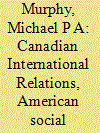| Srl | Item |
| 1 |
ID:
174043


|
|
|
|
|
| Summary/Abstract |
The last two decades have witnessed growing attention to the “Canadianization” of the field of International Relations. In this article, we forward a novel approach to testing the influence of domestic factors in Canadian International Relations. By analyzing the reading lists of comprehensive examinations from Canadian doctoral programs in International Relations, we can understand the ways in which Canadian institutions’ reading lists construct the hierarchy of the field’s journals. Among these journals, those based in the United States are most frequently assigned, with others hosted in the UK and around Europe. Canadian journals are rarely assigned to reading lists. French-language journals are also rarely assigned to reading lists, even in francophone institutions, and when they are, the journals are much more likely to be hosted in France than in Canada. We offer a series of guiding questions for future consideration of the “Canadianization” of International Relations education in Canada.
|
|
|
|
|
|
|
|
|
|
|
|
|
|
|
|
| 2 |
ID:
115302


|
|
|
|
|
| Publication |
2012.
|
| Summary/Abstract |
The electronic revolution in academic publishing brings promises as well as pitfalls. The main promises are greater efficiency, vastly greater access to the journal literature, a more equitable global sharing of intellectual resources, and hopefully improved quality. Open access-free entry to the electronic version of the journal literature-is in many ways a logical continuation of this development and will break the trend toward accelerating journal costs. But if the subscription revenue simply disappears, neither publishers nor editors will have the necessary funding to keep up peer review and other editorial routines. One alternative is to levy page charges for publication. Intermediate models are also possible, where the journal may keep its copyright to the final edited product while authors are allowed to post the final submitted version on their Web site. At the moment, open access is uncommon in international relations, but the publishers and owners of journals, including academic societies such as ISA, would be wise to think through these issues before they become acute. This symposium is a contribution to that process.
|
|
|
|
|
|
|
|
|
|
|
|
|
|
|
|
| 3 |
ID:
141824


|
|
|
|
|
| Summary/Abstract |
As new academic journals have emerged in political science and existing journals experience increasing submission rates, editors are concerned that scholars experience “reviewer fatigue.” Editors often assume that an overload of requests to review makes scholars less willing to perform the anonymous yet time-consuming tasks associated with reviewing manuscripts. To date, there has not been a systematic investigation of the reasons why scholars decline to review. We empirically investigated the rate at which scholars accept or decline to review, as well as the reasons they gave for declining. We found that reviewer fatigue is only one of several reasons why scholars decline to review. The evidence suggests that scholars are willing to review but that they also lead busy professional and personal lives.
|
|
|
|
|
|
|
|
|
|
|
|
|
|
|
|